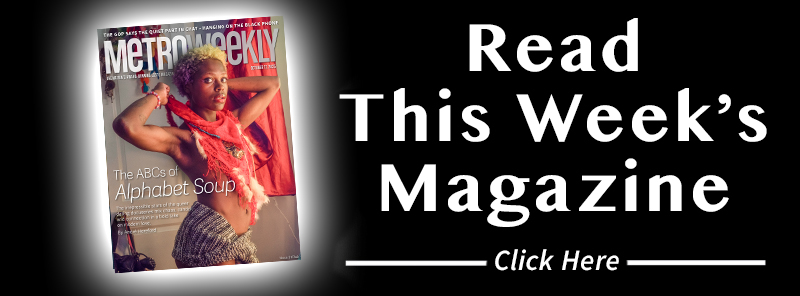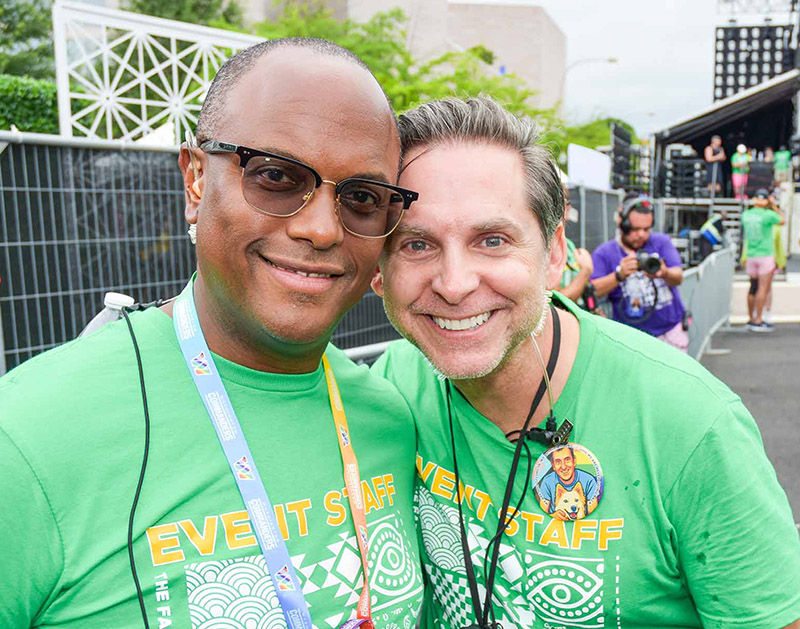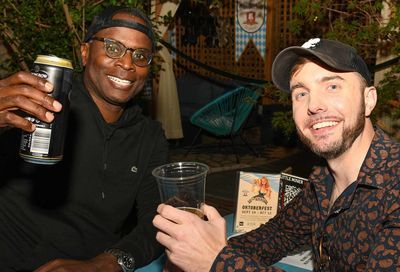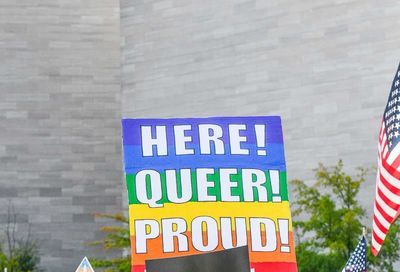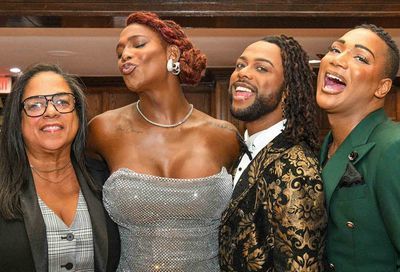Fear Factor
SONiA recreates her cherished band and sets her sights on performing at Capital Pride
“It’s like this infectious elation,” says SONiA of the feeling she gets performing at Gay Prides. “It’s just a beautiful thing.”
This being SONiA, of course, there is another side to her feelings — a split she attributes to her Gemini astrological sign.
“While my feeling is that Gay Pride is a great celebration, that here we are, a beautiful group of people, and that all the things that are unique about us really get to be celebrated that day, on the other hand, I feel incredibly sad and frustrated by the fact that still so many of us are put into a position of shame, and that some of us don’t embrace our sexuality to the universe on the other 364 days of the year.”
 Disappear Fear with SONiA (center) |
For nearly a decade, the open lesbian sang with her sister Cindy as Disappear Fear. When motherhood beckoned for the straight Cindy, SONiA flew solo. Her career soared, and her latest album, No Bomb is Smart, released last August, was one of the year’s most jubilant, extraordinary creations.
Recently, however, SONiA — with Cindy’s full blessing — recast Disappear Fear as a trio. The band — which includes drummer Laura Cerulli and bassist Angela Edge (aka Oxygen) — will appear on the Mainstage at Sunday’s Capital Pride Festival. SONiA’s bright and sunny disposition can’t mask her outspoken political nature, especially when it comes to her fellow gay brothers and sisters.
“There still a lot of stupid laws and a lot of unnecessary meanness that gets played out in our country and in the world,” she says. “There are countries in the world where you would be beheaded or stoned for living a homosexual existence. So even if Pride is viewed by some as just a big party in America on those days, it’s still very, very important.
“I think now more than ever there’s a continued strangulation of self-expression in America,” she continues, “especially if you’re not of the same belief as George W. Bush. If you believe anything different, then you’re rights are being taken away. And that’s a very scary thing. And that’s the one thing in the one way that gay people have in common with other minorities in this country — all kinds of minorities. So it’s that sort of solidarity that we need to look at and draw on to sort of take back America.
“I think we’ll always need pride,” she continues. “While I’m all for homogenized culture in terms of peace and love and equal rights, I also think it’s important to embrace our special-ness.”
Or, to put it another way:
“Pride is kind of like celebrating your birthday. And that’s a good thing no matter how old you are.”
PRIDE GUIDE: Folk music, particularly in the ’60s, took hold in our society as a form of protest, as a way to carry a message about concerns of the time. What concerns are important to you as a folk artist?
SONIA: Sometimes it’s something that’s really making me angry, like Fox News glorifying how beautiful this or that American tank is. On the song “No Bomb is Smart,” for example, I’m commenting on the whole premise that technology towards the destruction of human lives is stupid. To call a bomb smart is just silly. No bomb is smart. I’m all about paintball, you know? You want to do that, great. I’m all about flying jets fast — to do sky paintings. Let’s transform the military into something that creates. We build things to destroy ourselves. But we’re one family. It’s crazy. It’s just absurd.
This goes back to the Phil Ochs thing, but Ochs wrote songs from his heart and touched on issues that many singer-songwriters would never, ever, ever go near. [His music] gave me insight. And I made a promise to myself that I would write about what was really important to me. One of the things that was really important to me when I was 14-years-old and kind of figuring out that I was gay was that there weren’t gay songs on the radio. You couldn’t get that kind of thing.
So when I started Disappear Fear [I wanted to address gay issues], and my sister was like, “Just do what’s in your heart. People will either get it or they won’t get it.” It wasn’t necessarily about singing to the queer community, it was just doing what I do — just being loud, trying to make some noise one way or another.
PG: So your primary issue is that of your own sexuality.
SONIA: Yeah, I guess it’s just the same old love is love thing. It’s sort of a double-edged sword. It’s really nothing because it is just love. The other side of it is: “Who are you to tell me who I’m supposed to love?”
PG: Why did you choose music as your forum of expression?
SONIA: It’s just the way I live — like any bird, you know? I’m just [a songbird] in human form. And I’m glad that I can do it, because I love doing it. But there is reality too — the reality that you have to be able to eat and have a roof over your head. Fortunately, I can make that happen by making music.
PG: Well, you’re probably better paid that most birds. Are you ever surprised by how far your career has come? Nine CDs. The strong possibility of a Grammy nomination for your latest CD. Do you ever reflect on your success?
SONIA: Every now and then I go, “Wow, I really like this, I’m really glad I’m doing this. I can die now” — sort of one of those very deep sighs of accomplishment, but that’s pretty rare. I see my CDs as places I’ve been. And there are so many more or many more countries — or CDs — to go visit.
PG: How do you feel about these new online services, like Apple’s iTunes, that give people the option of buying individual songs rather than an entire album? Some artists I’ve talked to aren’t thrilled with it, claiming it compromises their overall vision for an album.
SONIA: Well, I’m all about it. Music is a personal choice. And people should have exactly what they want, when they want it, at the volume they want it, and as much as they want it.
PG: Other lesbian artists — Melissa Etheridge, k.d. lang and The Indigo Girls, for instance — achieved their superstardom before coming out. You’ve been out since the onset of your career. Do you think it’s even possible to become a musical superstar as a gay artist?
SONIA: [Laughs.] I’ll let you know in a couple of years.
PG: Well, let me ask you this, then: what do you think is the key?
SONIA: Having a label [support you], I think. Having some sort of mechanism behind you that can really pump it out there. And then having the people love you. But it takes a lot of money to get that kind of saturation to get it out there to that magnitude.
A musical career is not like one single door that you walk through. It’s a door here, a door there. The nature of our careers are such that they extend a little bit every day or every minute.
Advertisement
|
PG: Have you experienced any homophobia in the context of your own career?
SONIA: Oh, yeah. The main reason why I was never signed to a major label was because I was out. Actually, a few years ago RCA was doing a deal with Rounder Records to buy out my contract, but they wanted control of the content. And I wouldn’t be willing to give anybody control of that, ever. I think bombs are stupid. And I’m queer. And I’m Jewish. And I’m from Baltimore. I have all these weirdo things going on. [Laughs.]
PG: The music itself should be asset enough.
SONIA: From your mouth to God’s ears. Or better, a record label CEO’s ears.
PG: One last question: Why the small “i”?
SONIA: It’s how I wrote my name when I first started writing. I wrote Sonia with all capital letters and a small “i” when I was five years old. And I just continued to write it that way. Now I think it looks like a cool logo. And, you know, a small “i” also keeps the ego in check.
SONiA will appear with Disappear Fear on the Mainstage of the Capital Pride Festival on Sunday, June 12.
Support Metro Weekly’s Journalism
These are challenging times for news organizations. And yet it’s crucial we stay active and provide vital resources and information to both our local readers and the world. So won’t you please take a moment and consider supporting Metro Weekly with a membership? For as little as $5 a month, you can help ensure Metro Weekly magazine and MetroWeekly.com remain free, viable resources as we provide the best, most diverse, culturally-resonant LGBTQ coverage in both the D.C. region and around the world. Memberships come with exclusive perks and discounts, your own personal digital delivery of each week’s magazine (and an archive), access to our Member's Lounge when it launches this fall, and exclusive members-only items like Metro Weekly Membership Mugs and Tote Bags! Check out all our membership levels here and please join us today!








